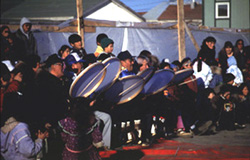|
|||||||||||||
|
|||||||||||||
|
INTRODUCTION This statement addresses the need to promote mutual respect and communication between scientists and northern residents. Cooperation is needed at all stages of research planning and implementation in projects that directly affect northern people. Cooperation will contribute to a better understanding of the potential benefits of Arctic research for northern residents and will contribute to the development of northern science through traditional knowledge and experience. These "Principles for the Conduct of Research in the Arctic" were prepared by the Interagency Social Science Task Force in response to a recommendation by the Polar Research Board of the National Academy of Sciences and at the direction of the Interagency Arctic Research Policy Committee. This statement is not intended to replace other existing Federal, State, or professional guidelines, but rather to emphasize their relevance for the whole scientific community. Examples of similar guidelines used by professional organizations and agencies in the United States and in other countries are listed in the publications.
IMPLEMENTATION
b. the person in charge and all investigators involved in the research, as well as any anticipated need for consultants, guides, or interpreters; c. the purposes, goals, and time-frame of the research; d. data-gathering techniques (tape and video recordings, photographs, physiological measurements etc.) and the uses to which they will be put; e. foreseeable positive and negative implications and impacts of the research
b. use of the languages of the local people; c. translation of research results, particularly those of local concern, into the languages of the people affected by the research;
b. In cases where individuals or groups provide information of a confidential or personal nature, this confidentiality must be guaranteed in both the original use of data and its deposition for future use. c. The rights of children must be respected. All research involving children must be fully justified in terms of goals and objectives and never undertaken without the consent of the children and their parents or legal guardians. d. Participation of subjects, including the use of photography in research, should always be based on informed consent. e. The use and deposition of human tissue samples should always be based on the informed consent of the subjects or next of kin. In implementing these principles, researchers may find additional guidance in the publications listed below. In addition, a number of Alaska Native and municipal organizations can be contacted for general information, obtaining informed consent, and matters relating to research proposals and coordination with Native and local interests. A separate list is available from NSF's Office of Polar Programs.
PUBLICATIONS Draft Principles for an Arctic Policy. Inuit Circumpolar Conference, Kotzebue, 1986. Ethics. Social Sciences and Humanities Research Council of Canada, Ottawa, 1977. Nordic Statement of Principles and Priorities in Arctic Research. Center for Arctic Cultural Research, Umea, Sweden, 1989. Policy on Research Ethics. Alaska Department of Fish and Game, Juneau, 1984. Principles of Professional Responsibility. Council of the American Anthropological Association, Washington, D.C., 1971, rev. 1989. The Ethical Principles for the Conduct of Research in the North. The Canadian Universities for Northern Studies, Ottawa, 1982. The National Arctic Health Science Policy. American Public Health Association, Washington, D.C., 1984. Protocol for Centers for Disease Control/lndian Health Service Serum Bank. Prepared by Arctic Investigations Program (CDC) and Alaska Area Native Health Service, 1990. (Available through Alaska Area Native Health Service, 255 Gambell Street, Anchorage, AK 99501.) Indian Health Manual. Indian Health Service, U.S. Public Health Service, Rockville, Maryland, 1987. Human Experimentation. Code of Ethics of the World Medical Association (Declaration of Helsinki). Published in British Medical Journal, 2:177, 1964. Protection of Human Subjects. Code of Federal Regulations 45 CFR 46, 1974, rev. 1983.
|
||||||||
| Web Policies and Important Links | | | Privacy | | | FOIA | | | Help | | | Contact NSF | | | Contact Webmaster | | | SiteMap |
|
Office of Polar Programs (OPP) The National Science Foundation, 4201 Wilson Boulevard, Arlington, Virginia 22230, USA Tel: (703) 292-5111 , FIRS: (800) 877-8339 | TDD: (800) 281-8749 |
|
|
Last Updated: Jul 10, 2008 |
|||



